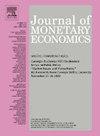Trade wars and the optimal design of monetary rules
IF 4.3
2区 经济学
Q1 BUSINESS, FINANCE
引用次数: 0
Abstract
Countries have an incentive to use tariffs to gain advantage over trade partners, but an optimal tariff must weigh the benefits of an improved terms of trade against the costs that the tariff imposes on the domestic economy. In the presence of monopoly distortions and nominal rigidities, the stance of monetary policy may have a large effect on the evaluation of these costs. In a global economy where all countries set tariffs unilaterally in a ‘trade war’, the final outcome can differ dramatically depending on different monetary policy rules. We set out a model of a trade war in a New Keynesian open-economy model. For any one country, a tariff improves the terms of trade but is costly due to its deflationary effect on the domestic economy. A monetary rule which targets the CPI or stabilizes the nominal exchange rate exacerbates these latter costs, and leads to lower equilibrium tariff rates in a trade war. Furthermore, an optimally delegated monetary rule can in fact completely eliminate a trade war.
贸易战与货币规则的优化设计
各国都有利用关税获得对贸易伙伴优势的动机,但最优关税必须权衡改善贸易条件的好处与关税对国内经济造成的成本。在存在垄断扭曲和名义刚性的情况下,货币政策的立场可能对这些成本的评估产生重大影响。在全球经济中,所有国家都在“贸易战”中单方面设定关税,根据不同的货币政策规则,最终结果可能会有很大差异。我们在新凯恩斯主义的开放经济模型中建立了一个贸易战模型。对任何一个国家来说,关税改善了贸易条件,但由于其对国内经济的通货紧缩效应而代价高昂。以CPI为目标或稳定名义汇率的货币规则会加剧后一种成本,并导致贸易战中均衡关税税率的降低。此外,最优授权的货币规则实际上可以完全消除贸易战。
本文章由计算机程序翻译,如有差异,请以英文原文为准。
求助全文
约1分钟内获得全文
求助全文
来源期刊

Journal of Monetary Economics
Multiple-
CiteScore
7.20
自引率
4.90%
发文量
90
审稿时长
74 days
期刊介绍:
The profession has witnessed over the past twenty years a remarkable expansion of research activities bearing on problems in the broader field of monetary economics. The strong interest in monetary analysis has been increasingly matched in recent years by the growing attention to the working and structure of financial institutions. The role of various institutional arrangements, the consequences of specific changes in banking structure and the welfare aspects of structural policies have attracted an increasing interest in the profession. There has also been a growing attention to the operation of credit markets and to various aspects in the behavior of rates of return on assets. The Journal of Monetary Economics provides a specialized forum for the publication of this research.
 求助内容:
求助内容: 应助结果提醒方式:
应助结果提醒方式:


